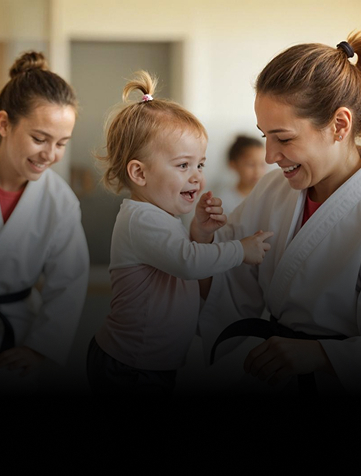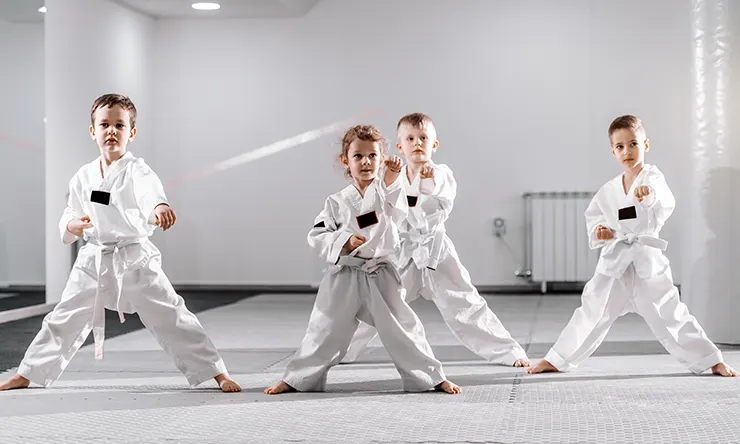Legacy Martial Arts – Experience the Legacy of Tradition in Youth Martial Arts
Legacy Martial Arts – Experience the Legacy of Tradition in Youth Martial Arts
Blog Article
How Karate for Children Can Boost Self-confidence and Discipline in Youthful Martial Artists
Karate for children provides an one-of-a-kind possibility to build self-confidence and technique in young martial artists. As they discover brand-new strategies and face challenges, they not only obtain skills but likewise create a solid sense of self-worth. This structured atmosphere urges them to respect the journey of enhancement. Exactly how does this training convert right into their day-to-day lives? Discover the much deeper connections that make karate more than just a sporting activity.
The Relevance of Confidence in Childhood Years Development
Confidence is a necessary structure block in childhood years growth. When you support your youngster's self-confidence, you equip them to encounter challenges, take risks, and express themselves freely. Kids with confidence are more happy to explore social circumstances and new activities, which can lead to lasting relationships and important experiences.Encouraging your child to get out of their convenience area cultivates durability. They discover that failure isn't the end yet rather a stepping stone to success. By celebrating their achievements, regardless of just how little, you aid them acknowledge their abilities and worth.In this trip, support and favorable support from you play a vital function. Whether it's with praise or merely existing, your participation boosts their confidence. As they expand, this self-assurance becomes a long-lasting possession, equipping them to browse both obstacles and opportunities with a solid sense of self.
How Martial Arts Shows Discipline and Emphasis
Karate assists you build technique and focus through its organized training regimen. As you exercise mindfulness during each session, you'll find out to concentrate better both on and off the floor covering. Plus, establishing and accomplishing objectives in karate enhances your capability to remain conscientious and dedicated.
Structured Training Routine
While you engage in karate training, you'll promptly discover just how a structured routine instills self-control and focus in young professionals. Each class complies with a certain format, consisting of workouts, technique method, and sparring. This uniformity instructs you to dedicate and respect the procedure to improvement. As you find out forms and methods, you create a feeling of obligation for your very own progress.The structured atmosphere motivates you to establish goals, whether grasping a new belt or perfecting a kata. You'll discover that remaining concentrated throughout classes and drills hones your concentration. The discipline you cultivate in karate prolongs beyond the dojo, positively affecting your schoolwork and everyday regimens. Each session strengthens the relevance of dedication, helping you turn into an extra self-displined person.
Mindfulness in Method
As you exercise martial arts, you'll locate that mindfulness becomes an important part of your training. Each step requires your complete focus, aiding you remain focused on the here and now minute. You'll find out to ignore interruptions and focus on your breathing, motions, and objectives. This enhanced recognition develops your reflexes and boosts your discipline.During sparring or forms, you'll uncover the significance of being psychologically present - Karate Salisbury MD. You'll notice how this emphasis not only enhances your strategy yet additionally constructs your self-confidence. By exercising mindfulness in karate, you cultivate perseverance and durability, essential qualities that expand beyond the dojo. In this method, karate teaches you to harness your mind, assisting you create a self-displined technique to difficulties both on and off the floor covering

Goal Setup Techniques
Setting objectives in karate isn't almost earning belts; it's an effective method to cultivate self-control and emphasis. When you establish details, achievable targets, you develop a roadmap for your progress. For example, rather of just intending to improve your kicks, try concentrating on grasping a specific method every month. This method maintains you inspired and engaged.Breaking down bigger goals into smaller sized, convenient steps helps you track your development and celebrate little success along the means. Whether it's refining your stance or boosting your sparring endurance, every objective enhances your commitment. As you achieve these goals, you'll construct self-confidence in your skills and establish a solid sense of self-control that expands past the dojo right into day-to-day life.
Structure Strength Via Martial Arts
Martial arts, particularly martial arts, offers kids a special opportunity to develop durability in a helpful setting. In classes, they face difficulties that push their limits, whether it's understanding a brand-new strategy or competing with a partner. Each setback, like a missed kick or a lost suit, comes to be an opportunity to find out and grow.As they exercise, youngsters find out to welcome pain and keep trying, even when points obtain hard. They find that failing isn't completion; it belongs to the journey. This mindset aids them jump back more powerful, not just in the dojo, but in day-to-day life.With each obstacle they get over, your nfl scoreboard youngster develops confidence in their ability to take on challenges, fueling their determination. Via martial arts, they'll recognize that durability isn't almost physical toughness; it's about psychological grit and willpower, equipping them to face whatever life tosses their way.
The Function of Respect in Martial Arts Training
Regard is a fundamental principle in karate training, fostering a society of self-control and sociability amongst trainees. When you step onto the dojo floor, you're not simply discovering methods; you're also finding out to appreciate your trainers, peers, and the art itself (Karate Salisbury MD). Bowing at the beginning and end of course isn't just a procedure; it symbolizes your recommendation of others' efforts and dedication.As you create shared regard, you'll discover it boosts your discovering experience. You'll listen a lot more attentively to your teacher and gain insights from fellow pupils. This environment motivates constructive criticism and assistance, allowing everybody to grow together.Moreover, regard cultivates self-discipline. Identifying the value of effort and humility assists you remain focused on your training. Subsequently, this regard equates right into your day-to-day life, improving your interactions and partnerships outside the dojo. Through martial arts, you discover that regard is necessary for individual growth and community building
Establishing Objectives and Accomplishing Success in Karate

Social Skills and Teamwork in the Dojo
While training in the dojo, kids normally establish necessary social abilities and synergy capacities. As they exercise together with peers, they find out to connect properly, share room, and assistance one another. check here Each course presents possibilities for cooperation, whether it's during partner drills or team exercises. This teamwork cultivates friendships and creates a feeling of belonging, making the dojo a nurturing environment.Kids also gain valuable problem resolution skills. When they encounter obstacles, such as differences during sparring, they find out to navigate these scenarios constructively. They practice perseverance and compassion, understanding that every person has different toughness and weaknesses.Moreover, joining team activities grows a sense of accountability. You'll see your youngster learning to count on teammates and take obligation for their role in a group. These experiences not just improve their fighting styles journey yet likewise outfit them with social tools they'll bring into other locations of life.

The Long-Term Perks of Martial Arts Beyond Childhood
As youngsters expand up and change into their adult years, the advantages of martial arts expand far past the dojo. You'll locate that the discipline and focus discovered via martial arts can translate into your academic and expert life. Setting and accomplishing objectives in fighting styles cultivates a solid job ethic, which can push you to stand out in any type of endeavor.Moreover, the confidence obtained from sparring and mastering techniques can enhance your self-confidence, assisting you deal with difficulties head-on. This strength comes to be important as you face the uncertainties of adulthood.Additionally, the social skills developed through teamwork and camaraderie in the dojo can lead to better relationships in both professional and personal spheres. You'll learn to communicate effectively, willpower problems, and construct a helpful network.Ultimately, karate forms not simply knowledgeable martial musicians, however all-around individuals all set to tackle the globe.
Frequently Asked Questions
What Age Is Ideal to Beginning Martial Arts for Children?
You can start martial arts as very early as age four or five, yet it commonly depends upon your child's maturation and passion. Discovering a class that matches their age and power level makes a big distinction.
Are There Any Wellness Perks From Practicing Karate?
Yes, exercising karate offers countless health benefits. You'll boost your adaptability, strength, and coordination while improving cardiovascular health and fitness. Plus, it boosts emphasis and mental wellness, making it a great selection for overall physical and psychological health and wellness.
Exactly How Frequently Should Kids Attend Martial Arts Classes?
You must urge your youngsters to participate in karate classes a minimum of 2 to 3 times a week. Consistency aids them learn techniques effectively and establish abilities, making their experience much more satisfying and fulfilling over time.
Can Karate Assist With Taking Care Of Anxiety in Children?
Yes, martial arts can aid manage anxiousness in children. It shows emphasis and self-constraint while providing a risk-free electrical outlet for power. You'll see your youngster growing much more certain and calm as they practice consistently.
What Gear Is Needed for Kids Starting Karate?

Report this page